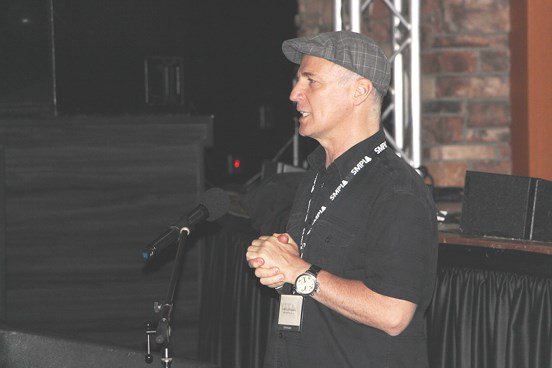Not many people know the story of Rumble: The Indians who Rocked the World. That’s the point of the documentary, in fact, since many of the artists were forced to hide their First Nations heritage in order to have a music career, or even just to live in America. With Link Wray as a starting point, the film showcases a wide range of indigenous musicians and the struggles they faced to play their music in front of the world, along with interviews from the many people they influenced along the way. The film kicked off the Yorkton Film Festival.
Alfonso Maiorana, co-director of the film, was in town at the screening at the Painted Hand Casino. His first time at the film festival, Maiorana was happy to screen the film in Saskatchewan, near where Buffy Sainte-Marie, one of the film’s subjects, grew up in Fort Qu’Appelle.
The goal of the film was to tell the story of these artists, but also to point out where their culture influenced their sound. Maiorana hopes that after people watch the film, they hear the music in a new way and appreciate how Indigenous culture has influenced what they are hearing.
“When you watch the film you realize that a lot of this music was banned in the past. A lot of Indigenous people were not able to openly talk about their Indigenous roots or their Indigenous identity, and that’s why this film is important. Now, when you listen to the music and realize that behind this music there is Indigenous influence, then it changes your perspective.”
The film took five years to make, and since it is filled with celebrity interviews and popular music it was not an easy film to produce – Maiorana remembers an interview with Iggy Pop where they were informed two days before that they had to meet him in his hotel room in Detroit.
“Any time you want to tell a story with some famous people who are important to the story, it’s a big endeavor. You need a lot of people and a lot of time on your side.”
It was difficult, but Maiorana said that it was made easier by how many people believed in the project and the story they were telling.
“They were supportive and wanted to be part of it, it was just that getting them to commit at a certain time on a certain day was difficult. Getting them on a documentary project was at times the bottom of the ladder, but they wanted to be part of it.”
The film is just scratching the surface of Indigenous influence in music, and Maiorana admits they could easily do a follow up because there are so many stories to tell.



